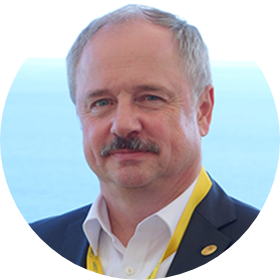Welcome to HMS 2021!
Dear Sir/Madam,
innovations and improvements are required to react quickly to the new trends of the global economy. Over the years, Modeling & Simulation (M&S) has proved to be one of the most effective, beneficial and successful methodologies to investigate and study complex systems belonging to various sectors/areas. Nevertheless, to take full advantage of this technology there are relevant issues that keep challenging the researchers towards even more advanced solutions and approaches where emerging and cutting-edge technologies are absorbed into. M&S is widely and successfully applied in many application domains, ranging from industry to social sciences, from logistics to military, from energy to healthcare; in this sense M&S provides a multidisciplinary perspective where theory and data from different fields can be used to build models and simulations that provide insights in to the system considered.
The 2021 International Conference on Harbor, Maritime and Multimodal Logistic Modelling and Simulation will be a platform for knowledge exchange, the review and discussion of theoretical advances, research results, and industrial experiences, among scientists, researchers, decision makers, practitioners and students dealing with the topics under the umbrella of multidisciplinary modeling & simulation.
Therefore, we would like to kindly invite you to take an active part in this conference and in the co-located events that will be held at Krakow, Poland on September 15-17, 2021 and explore with us the latest news, views and developments in the exciting world of multidisciplinary modeling & simulation.
Sincerely,
I3M 2021 Organization Committee

Topics & Tracks
Authors are kindly invited to include in their papers and presentations all the research works, case studies and application both theoretical and applied. Topics of interests include the following topics, however different ones concerning Modeling & Simulation in Industry are welcome.
- Topics
- Automation
- Concurrent Engineering
- Electronic Data Interchange
- Environment Management
- Freight Transport Planning
- Harbour Simulation
- Industrial Engineering
- Logistics & Manufacturing
- Naval Architecture
- Naval Training Systems
- Total Quality Management
- Resources Planning
- Safety & Security in Maritime Environment
- Vessel Traffic Systems
- Urban Transportation
- Applications
- Bulk Terminals
- Container Terminals
- C4I & Military Systems
- Harbour Services
- Industrial Facilities
- Navigation Lines
- Multimodal Transports
- Oil Terminals
- Passenger Terminals
- Railways
- Ro-Ro Terminals
- Ships & Platforms
- Supply-Chains
- Warehouses
Tracks
Chair: Lawrence Henesey
Affiliation: Blekinge Institute of Technology (Sweden)
Track Description: With the emergence of new technology paradigms, such as Cloud computing, BigData, A.I. (Artificial Intelligence), Machine Learning and IoT (Internet of Things) leads to questions on how to develop and operate automated or autonomous systems that can be applied to logistics systems, such as those found in container terminals. This session will focus on applied or theoretical research issues, such as:
- Smart Logistics in handling of cargo and data
- Automation handling and processes
- Digitalization – considers Industry 4.0, big data or the Industrial Internet of Things (IoT), everything will be connected, everything will be automated and run super efficiently
- Thinking in terms of system interoperability between man and machines for more holistic integration
- Improved smart decision-making using techniques from Computer Science (i.e., machine learning and A.I.)
The research submissions are to assist in improving performance of ports and container terminals, the research work will contribute to expanding the body of science.
Please be sure to select “Digitalisation in Ports” as main topic during the submission.Chair: Elvezia M. Cepolina
Affiliation: University of Pisa (Italy)
Track Description: The session focuses on a sustainable mobility within urban areas. It concerns the modelling and simulation of transport systems, including urban freight transport. New vehicles, vehicle fleet management strategies, traveller information services, route guidance are some of the topics this session concerns.
Please be sure to select “Innovative Transport Systems for Urban Areas and Urban Freight Transport” as main topic during the submission.Chair: Manfred Gronalt
Affiliation: University of Natural Resources and Life Sciences (Austria)
Track Description: Simulation and optimisation have become highly valuable and closely allied technologies in logistics and supply chain management. Metamodelling offers new advanced techniques for simulation-based analysis and optimisation. This track is dedicated to documenting and exploring research and applications of simulation metamodelling and optimisation in logistics and supply chains. The track focalizes on “Intermodal transportation systems and services”. Topics of interest are:
- Rail/road terminals
- Configuration & design issues, operations management and dispatching
- Loading, unloading and transshipment systems, feeding systems efficiency & performance measurement evaluation & benchmarking
- Planning multimodal terminal networks
- Risk assessment & prioritization
- Information technology and decision support systems for intermodal operators, shippers and forwarders
- Environmental and social political aspects
- Future aspects: challenges & opportunities revising the concept of Intermodal transportation networks and services
- Digitalisation
- Value added services
- Terminal operating system
- Automated failure detection of containers and trailer
Co-Chairs: (a)Michela Longo, (b)Seyedmahdi Miraftabzadeh, (c)Federica Foiadelli
Affiliation: (a)(b)(c)Politecnico di Milano (Italy)
Track Description: Electric Mobility industry faced different challenges to readjust E-mobility in nowadays life, particularly in smart cities. In the complex vehicle environment, state-of-art technologies are required to consider all essential variables are influencing it while conventional algorithms have limited capabilities for combating such a challenge. This session is dedicated to introducing, reviewing and exploring the applications of Machine Learning and Big Data on E-mobility as promising solutions for future trends. Topics of interest of this special session include, but are not limited to:
- Innovative charging systems
- G2V and V2G and concepts
- Integrating EV with Storage and Grids
- Intelligent transportation management systems
- Driving condition learning and prediction in vehicular network
- Battery health prognosis system
- Range estimation
Co-Chairs: (a)Eleonora Bottani, (b)Roberto Montanari
Affiliation: (a)(b)University of Parma, (Italy)
Track Description: Managing, integrating and optimizing the entire supply chain are key factors for a successful business. World-class organizations now realize that non-integrated manufacturing processes, non-integrated distribution processes and poor relationships with suppliers and customers are inadequate for their success. The proper management of a supply chain encompasses a set of decisions, which embrace both strategic and tactical levels, and include the supply chain structure (number of echelons required and number of facilities per echelon), the selection of the inventory management policy, the assignment of each market region to one or more locations, the selection of suppliers for sub-assemblies, components and materials, the optimization of transports and connections. Simulation is a powerful tool to observe the behaviour of supply chains, assess their efficiency level, evaluate new management solutions, identify the most suitable configuration and optimize the whole distribution channel. By means of simulation models, researchers are enabled to quantify the benefits resulting from supply chain management, in order to support decision making either at strategic, tactical or operational level. Given this overview, this track is devoted to studies that exploit simulation to the analysis of supply chains, including the following topics:
- Supply Chain Management (SCM) and Cold Chain Management (CCM)
- Supply chain cost control strategies and cost optimization
- Supply chain automation
- Process modelling
- Design and optimization of logistics networks, transport activities and reverse logistics systems
- Planning and design of the supply chain structure
- Inventory management policies
- Use of ICT tools (e.g., RFID, 2D barcode, EDI,…) for the optimization of SCM and CCM
- Data warehousing
- Artificial intelligence tools for SCM and CCM
Chair: Diego Crespo Pereira
Affiliation: University of La Coruna (Spain)
Track Description: The track is devoted to offer researchers and practitioners the opportunity to present, discuss and learn about the latest achievements on Modelling & Simulation in Logistics, Traffic and Transportation, encouraging international collaborative research and demonstrations of current innovative projects. Topics covered include but are not limited to:
- Strategies and concepts for logistics
- Technical and organizations planning of logistics systems
- Supply chains and logistics network design
- Physical distribution and facility location
- Modelling and simulation of logistic and transport systems
- Distribution centres and warehousing decisions
- Outbound and inbound logistics
- Transportation management and logistics
- Information management in logistics systems
- Traffic flows demand, control and performance
- Multi-modal systems
- Reverse and green logistics
- Freight transport planning
Co-Chairs: (a)Tobias Reggelin, (b)Alejandro Garcia
Affiliation: (a)Otto von Guericke University Magdeburg / Fraunhofer Institute for Factory Operation and Automation IFF (Germany), (b)Integrated Group for Engineering Research, University of La Coruna (Spain)
Track Description: Developments in the operational and supply chain arena suggest that building and managing a comprehensive and efficient supply chain system depends on capturing within a model the dynamics inherent in multiple and intricate supply chain factors. To meaningfully capture these complexities it is necessary to employ tools that generate feasible and reliable solutions. In accordance, the purpose of this track is to present the latest developments in supply chain management research in which both theoretical and practical issues are addressed. Conceptual paper must be inclusive of numerical analysis or case illustrations. Covered topics include, but are not necessarily limited to, the following:
- Global supply chain or green supply chain management
- Cost control using activity based management
- Lean supply chain management
- Reverse logistics and return/waste management
- E-business and supply chain or closed-loop supply chain management
- Asset management in the logistics industry
- Assessment of risks or disruptions
- Financial logistics and logistics and revenue management
- Outsourcing relationship management
- Strategic alliance or supply chain partnerships
- Institutional perspectives
Co-Chairs: Manfred Gronalt
Affiliation: University of Natural Resources and Life Sciences (Austria)
Track Description: Daily logistics operations within urban areas are subject to a wide range of uncertainties such as unsuccessful delivery attempts as well as dynamic traffic and parking situations. Simulation and optimization have become highly valuable methods to investigate and optimize related problem settings. This track is dedicated on recent advances and approaches exploring research and applications of simulation and optimization methods in urban logistics and supply chain management. The track focalizes on “Modelling urban logistics systems”. Topics of interest are:
- Last-mile distribution and city logistics concepts
- Sustainable commercial modes of transport such as cargo-bike and e-mobility
- Urban consolidation strategies
- Loading, unloading and transshipment systems dedicated to urban operations
- Time slot management
- Omni-channeling including click & collect and various home-delivery concepts
- Environmental, social and policy aspects
Co-Chairs: (a)Agostino Bruzzone, (b)Miquel Angel Piera
Affiliation: (a)DIME University of Genoa (Italy), (b)Universitat Autonoma de Barcelona (Spain)
Track Description: While globalization of the economy has received a continuous increase in volume of freight traffic during the past years, theoretical and methodological approaches and ideas for sustainable transport logistics are poorly developed. In this context, the regulatory push effect for sustainable transport logistics forces the economy to find new ways and perspectives for saving resources and environment. On the other hand, the industry pull effect can profit from their changes of transport systems to be more competitive and efficiency on the global market. The aim of this track is for researchers and practitioners to exchange new ideas and practical experience in planning sustainable transport logistics. Against this background, this track includes following topics:
- Modeling and simulation of transport systems
- Comparison and optimization of transport systems
- Methods and tools for computation of emission in transport logistics
- Methods and tools for planning of multimodal transport systems
- Management application of multimodal transport systems: Case studies
- Approaches of emission reporting in transport logistics
- Approaches of multi agent systems in transport logistics
Chair: Andreas Riener
Affiliation: Technische Hochschule Ingolstadt (THI), Germany
Track Description: The variety of traffic situations and IVIS/ADAS functions pose considerable demands on functional safety and integration tests already today. Both complexity and safety requirements will continue to increase with automated vehicles. As a consequence, validation of automated driving functions using established testing methods, such as endurance testing (as specified in ISO 26262), will no longer be possible. As a consequence, new simulation-based approaches or virtual testing concepts need to be developed. This HMS track puts particular focus on simulation tools and virtual testing methodologies for autonomous and connected vehicles along with advanced driving assistance system (ADAS) applications. Human factors (i.e., improved human models for driving simulation) as well as augmented/virtual topics will complete the scope of this track. Topics of Interest are, amongst others:
- Scenario modeling
- Training and validation of sensor models
- Automotive (Real-time) sensor simulation and validation of simulation models
- Analysis of environmental effects on surround sensors (Replication and simulation of environmental effects/adverse weather conditions)
- Virtual testing of ADAS/autonomous driving functions
- Simulation as a means for testing and validating data processing algorithms
- Benchmarking of sensor data fusion algorithms
- Simulation models and architectures for autonomous/connected vehicles
- Human factors in simulation (human models, perception models, etc.)
- Augmented (AR) and/or virtual reality (VR) for driving simulation
Co-Chairs: (a)Edward Williams, (b)Galina Merkuryeva
Affiliation: (a)PMC-Dearborn (USA), (b)Riga Technical University (Latvia)
Track Description: Simulation and optimisation have become highly valuable and closely allied technologies in logistics and supply chain management. Metamodelling offers new advanced techniques for simulation-based analysis and optimisation. This track is dedicated to documenting and exploring research and applications of simulation metamodelling and optimisation in logistics and supply chains. Topics covered include but are not limited to:
- Optimisation of Logistic Processes through Simulation
- Simulation Optimisation Methods in Supply Chains
- Simulation Metamodelling in Logistics and Supply Chains
- Simulation Optimisation via Metamodelling
- Simulation-based Hybrid Optimisation Techniques
- Meta-optimisation and Simulation in Logistics
- Simulation Optimisation Software
- Modelling and Simulation Optimisation Applications in Logistics and Supply Chains
Co-Chairs: (a)Michael Affenzeller, (b)Witold Jacak, (c)Thomas Kern
Affiliation: (a)(b)(c)University of Applied Sciences (Austria)
Track Description: The track deals with modeling and simulation topics in the context of electric, energy-efficient, economic, and ecological mobility. Topics of interest are as follows:
- Multi-physics/multi-body simulation and visualization of mechatronic systems, drives and materials for e-mobility
- Modeling of energy sources and networks like traction batteries, alternative fuels, and smart grids for life time quality management, ecological balancing and optimization
- Models for energy-efficient logistics, B2B integration and supply chain management
- ICT-models for route planning optimization, secure e-mobility applications, dynamic drive information systems, mobile radio networks, virtual mobility and e-work
Submit an Open Track Proposal
Are you willing to propose an open track and collect papers focusing on a specific subject? Fill the form and send it to f.longo@unical.it and massei@itim.unige.it.
Key Dates
Paper Submission Deadlines
- Special Session/Open Track Proposal Closure: April 15th, 2021
-
Draft Paper Submission Deadline:
April 15st, 2021May 15th, 2021 -
Notification of Acceptance & Review Reports:
May 15st, 2021June 15th, 2021 -
Camera-ready Paper Submission Deadline:
June 15st, 2021July 15th, 2021
Registration Deadlines
- Early Bird Registration Closure: July 1st, 2021
- Late Registration Closure: September 13th, 2021
Committees
HMS 2021 Organization Board

Agostino Bruzzone
HMS General Co-Chair
University of Genoa, Italy

Yuri Merkuryev
HMS General Co-Chair
Riga Technical University, Latvia

Miquel Angel Piera
HMS Program Co-Chair
Universitat Autonoma de Barcelona, Spain

Eleonora Bottani
HMS Program Co-Chair
University of Parma, Italy
HMS 2021 Organization Staff
Agostino G. Bruzzone – University of Genoa, Italy
Alessandro Chiurco – DIMEG, University of Calabria, Italy
Virginia D’Augusta – DIMEG, University of Calabria, Italy
Jessica Frangella – DIMEG, University of Calabria, Italy
Caterina Fusto – DIMEG, University of Calabria, Italy
Lucia Gazzaneo – DIMEG, University of Calabria, Italy
Luca Giansiracusa – CAL-TEK S.r.l., Italy
Francesco Longo – University of Calabria, Italy
Marina Massei – Liophant Simulation, Italy
Letizia Nicoletti – CAL-TEK S.r.l., Italy
Mohaiad Osman Elbasheer – MSC-LES, University of Calabria, Italy
Antonio Padovano – University of Calabria, Italy
Cataldo Russo – CAL-TEK S.r.l., Italy
Simone Talarico – DIMEG, University of Calabria, Italy
Marco Vetrano – CAL-TEK S.r.l., Italy
Kirill Sinelshchikov – Simulation Team, Italy
HMS 2021 International Program Committee
Michael Affenzeller – University of Applied Sciences, Austria
Eleonora Bottani – University of Parma, Italy
Agostino Bruzzone – University of Genoa, Italy
Elvezia M. Cepolina – University of Pisa, Italy
Diego Crespo Pereira – University of La Coruna, Spain
Branislav Dragovic – University of Montenegro, Montenegro
Federica Foiadelli – Politecnico di Milano, Italy
Alejandro Garcia Del Valle – University of La Coruna, Spain
Felix Breitenecker – Technical University Of Wien, Austria
Manfred Gronalt – University of Natural Resources and Applied Life Sciences, Austria
Lawrence Henesey – Blekinge Institute of Technology, Sweden
Witold Jacak – University of Applied Sciences, Austria
Thomas Kern – University of Applied Sciences, Austria
Francesco Longo – University of Calabria, Italy
Michela Longo – Politecnico di Milano, Italy
Marina Massei – University of Genoa, Italy
Yuri Merkuryev – Riga Technical University, Latvia
Galina Merkuryeva – Riga Technical University, Latvia
Seyedmahdi Miraftabzadeh – Politecnico di Milano, Italy
Roberto Montanari – University of Parma, Italy
Letizia Nicoletti – Cal-Tek Srl, Italy
Antonio Padovano – University of Calabria, Italy
Miquel Angel Piera – Autonomous University of Barcelona, Spain
Tobias Reggelin – Otto Von Guericke University Magdeburg, Germany
Andreas Riener – Technische Hochschule Ingolstadt (Thi), Germany
Edward Williams – Pmc-Dearborn, USA
Nenad Zrnic – University Of Belgrade, Serbia
Get on board the team now!
Are you willing to join the Organization Committee or the International Program Committee? Discover the benefits and opportunities now and submit your proposal.
Organized by

For further info, please contact